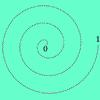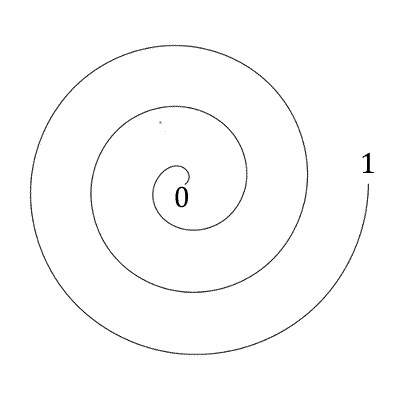Or search by topic
Number and algebra
Geometry and measure
Probability and statistics
Working mathematically
Advanced mathematics
For younger learners
Spiralling Decimals for Two



- Problem
Here's a game to play with an adult!

Have you noticed that some very long numbers are very big whilst other very long numbers are small? Can you think of an example of each?
Here's a game where you can test your skill at putting small numbers into the right order - it's not as easy as it sounds!
How do you play?
You'll need an adult to play with.
You'll also need a copy of the game board and two different coloured pencils.
Decide who goes first.
Take turns to choose a number from the grid and mark it on the spiral. Make sure you know where 0 and where 1 is!
Keep taking turns until one of you has marked three numbers next to each other.
| 0.5 | 0.25 | 0.75 | 0.3 |
| 0.35 | 0.9 | 0.99 | 0.999 |
| 0.1 | 0.01 | 0.05 | 1.79 |
| 0.64 | 0.32 | 0.54 | 0.865 |

Can you work out a winning strategy?
Does it matter who goes first?
Does it matter which number you choose first?
This game is to help children learn how decimals are ordered, without worrying about exactly where the decimals should go on a number line - only the order of the numbers matters in this game.
Easier version: try this version, with decimals with one decimal place which need to be placed between 0 and 2.
Harder version: encourage the child to make up a different set of numbers, with different start and end numbers for the spiral.
When you've completed a game, talk together about good strategies. Does it matter who goes first? Does it matter which number you choose first?
There's a group version of this game here.
You may also like
Traffic Lights
The game uses a 3x3 square board. 2 players take turns to play, either placing a red on an empty square, or changing a red to orange, or orange to green. The player who forms 3 of 1 colour in a line wins.
Yih or Luk Tsut K'i or Three Men's Morris
Some puzzles requiring no knowledge of knot theory, just a careful inspection of the patterns. A glimpse of the classification of knots and a little about prime knots, crossing numbers and knot arithmetic.

